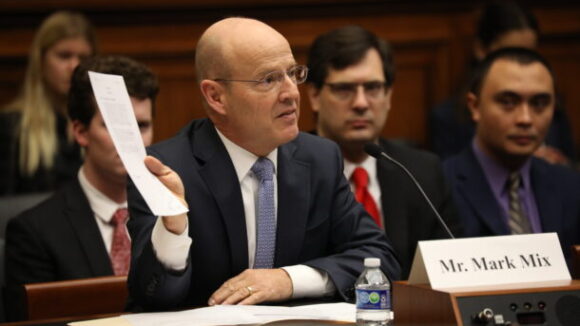Committee President's Statement on Senate 'Labor Law Reform' Hearing
On Wednesday, October 8th at 10:00 AM ET, the Senate Health, Education, Labor, and Pensions (HELP) Committee will hold a…

What impact does handing a union monopoly power to deal with your employer on matters concerning your pay, benefits, and work rules have on your pay?
A quick look at unionstats.com — a website more formally referred to as Union Membership, Coverage and Earnings from the CPS Database — shows that in present-day America, at least, there is no clear, simple connection between unionization and higher pay, and there may be none at all.
For example, according to unionstats.com, a compilation of federal data from the monthly household Current Population Survey (CPS) constructed by economists Barry Hirsch, David Macpherson, and William Even, the mean hourly pay in 2023 for union-free workers with private sector manufacturing jobs was $39.46. That’s 26% higher than the average for private-sector factory workers who are union members.
Of course, it is at least theoretically possible that other demographic factors influencing compensation are sufficient, or even more than sufficient, to account for union members’ substantially lower mean hourly pay in the manufacturing sector. In fact, that is what Drs. Hirsch, Macpherson, and Even assert.
But unionized manufacturing workers who know they are earning eight dollars an hour less than the mean for union-free manufacturing workers will understandably be skeptical if told they are better off because Big Labor bosses have monopoly power to “negotiate” their terms and conditions of employment.
National Right to Work Committee President Mark Mix commented: “Even in cases where the overall net impact of unionization is to increase the share of business revenues that go into wages for production employees, some or many of the workers may still end up worse off.
“Among the types of workers whose paychecks are often smaller because they are subject to so-called union ‘exclusivity’ are those who are especially talented and/or hardworking.
In fact, over the years a number of academic apologists for Organized Labor have made no bones about the fact that workers whose productivity is above average typically get paid less when they are unionized. Take, for example, Richard Rothstein, now a distinguished fellow with the union-boss founded Economic Policy Institute.
In a brief survey of academic literature on the impact of exclusive union bargaining on the pay of employees with diverse levels of skill and industriousness, Mr. Rothstein has written: ‘In [unionized] firms, wages of lower paid workers are raised above the market rate, with the increase offset . . . [in part] by reducing pay of the most productive workers.’”
When union officials do actually secure across-the-board higher pay for workers than employers acting purely on their own initiative would offer, there are almost invariably consequences that may be detrimental to those same workers’ economic interests over time.
In a scholarly article analyzing Organized Labor’s overall impact on private companies’ economic performance, the aforementioned Barry Hirsch has observed that wage gains extracted from employers by union negotiators are rarely if ever fully compensated for by higher worker productivity.
Normally, unionized businesses have to compete with other firms for customers on price as well as quality, and therefore cannot simply raise their prices to offset the cost of the pay increases to which they acquiesce.
Instead, union boss-secured pay gains typically result in lower earnings for the company, lower returns on investment for shareholders, and lower stock prices.
“Especially when the unionized firm must deal with unforeseen changes in consumer demand, Big Labor ‘victories’ in contract negotiations can even lead to bankruptcy and unemployment for workers,” commented Mr. Mix.
A recent poignant example is the downfall of San Francisco’s Anchor Brewing Company, a firm long beloved by beer drinkers that had been in business since the late 19th Century.
In March 2019, union militants, acting with ample assistance from the virulently anti-free market Democratic Socialists of America (DSA), secured monopoly bargaining privileges over workers at Anchor, which just two years earlier had been bought out by Sapporo, the oldest brand of beer in Japan.
At the end of 2019, officers of International Longshore Workers Union (ILWU) Local No. 6 won ratification of a three-year contract that standardized pay rates and raised wages by 20% to 25% as of January 2021.
This turned out to be more than the company could afford at a time when mid-sized brewers like Anchor are facing increased competitive pressure from both larger beer companies and proliferating small craft breweries.
Anchor lost millions of dollars in 2020, primarily as a consequence of COVID-19 and related government-ordered lockdowns that boarded up bars and restaurants. But even in 2022, after America had learned to live with COVID-19 and the lockdowns had ended, the brewery still lost roughly $10 million.
In July 2023, Sapporo announced that, despite its efforts over the years to save the company by releasing new products and making brand investments, business had failed to turn around. Consequently, Anchor would be shutting down for good.
Over the course of a few years, it seems, Anchor unionization turned out to be a much better financial proposition for union organizer and DSA member Brace Belden than for Anchor’s ordinary employees. Mr. Belden’s organizing success greatly raised the profile of his TrueAnon podcast, which, according to a 2023 New York Post article, now rakes in “more than $1.2 million a year from Patreon subscribers alone”!
Pay and job security are just two of many ways in which unionization potentially affects an employee’s working life. In many cases, it may be difficult to place a dollar value on the change, but for many employees the nonquantitative consequences are the most important.
Take the case of Ben Branch, now a finance professor emeritus at the Isenberg School of Management of the University of Massachusetts (UMass) Amherst. From 2014 to 2019, he was one of four plaintiffs in a state court case challenging the constitutionality of union exclusivity in the government sector.
As a 2018 brief filed in that case by a National Right to Work Legal Defense Foundation attorney documented, none of the plaintiffs wished to be subject to exclusive union representation regarding key terms and conditions of his or her employment.

The principal reason put forward by Dr. Branch was not directly about his pay or job security. Rather, he charged that the union officials who are empowered to speak for all UMass professors on workplace matters make it harder to “weed out ineffective and unproductive faculty.” This “places additional burdens on the most effective and productive” faculty.
In subsequently rejecting the Branch plaintiffs’ plea to allow them to represent themselves with regard to important workplace matters, the Massachusetts Supreme Court did not contest their contention that they were worse off as a consequence of being subject to union monopoly control.
Instead, relying on private-sector precedents such as Ford Motor Co. v. Huffman, the court found that the “mere” fact that some workers are harmed by Big Labor rule while others are helped does not mean union officials have violated their very limited obligations under the so-called “duty of fair representation.” As long as the contract provisions that help some employees at others’ expense are “reasonable” and “negotiated in good faith,” concluded the court, they are legally permissible.
“Federal data, scholarly analyses and workers’ personal experience all show that the individual can clearly be hurt by unionization,” concluded Mr. Mix.
“It is brazenly presumptuous of union bosses to claim, explicitly or tacitly, that they know better than any worker does whether unionization constitutes a benefit for him or her. In the words of John Stuart Mill, ‘with respect to his [or her] own . . . circumstances, the most ordinary man or woman has means of knowledge immeasurably surpassing those that can be possessed by anyone else.’”
This article was originally published in our monthly newsletter. Go here to access previous newsletter posts.
To support our cause and help end forced unionism, go here to donate.

On Wednesday, October 8th at 10:00 AM ET, the Senate Health, Education, Labor, and Pensions (HELP) Committee will hold a…

Committee President: Union Violence is an Ongoing Problem Washington, D.C. (September 8, 2025) – The National Right to Work Committee commended Pennsylvania Congressman…

Employment in Right to Work States up by 10.1 Million Since 2014